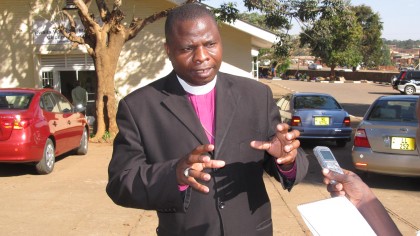Right Reverend Bishop Emmanuel Fanuel Magangani of the Anglican Diocese of Northern Malawi is the first prominent church leader to announce that he was recently circumcised as part of the country’s efforts to promote Voluntary Medical Male Circumcision (VMMC).
I-TECH’s Pius Mtike (PM) sat down with Bishop Magangani (BM) to find out more about the bishop’s experience with VMMC and why he decided to go public about this personal matter.
 PM: Bwaila is one of the dedicated VMMC sites in Malawi that opened in September 2012. You are one the 6,205 males who have been medically circumcised there. What led you to make the decision?
PM: Bwaila is one of the dedicated VMMC sites in Malawi that opened in September 2012. You are one the 6,205 males who have been medically circumcised there. What led you to make the decision?
BM: I have done it for the sake of the people I serve.
PM: What do you mean?
BM: Although I am not speaking in the official position of Anglican Church in Malawi, I remain convinced that my personal experience of VMMC will help to serve some lives of those who are still contemplating whether or not to access VMMC service.
To begin with, the Church is responsible for the body and soul of a human being. HIV and AIDS scourge is undoubtedly one of the difficult battles of our time. This fight involves the entire community with the Church at its center.
The leadership of the Church must take a lead on health related issues because bodily life and health are goods entrusted to man by God. Accordingly, there is an obligation to take care of one’s health.
HIV and AIDS continues to take many lives; we must try every possible way available to fight reduce further transmission. The role male circumcision in HIV prevention just shows that science is in agreement with the word of God. You remember in Genesis 17: God commanded Abraham while he was in his old age to go for circumcision to enter into a special covenant with God. Whatever God did, he used to say: It is good. We too should promote what is good in the sight of God.
I must hasten to emphasize that circumcision has nothing to do with salvation. It is only Jesus Christ who serves. MC must be encouraged because God recommended it. It is good in his sight. It is also good for our own health and safety
PM: As someone who is championing medical male circumcision, how does VMMC help to reduce HIV infection?
BM: Health workers are more competent to explain that, but before accessing my VMMC services, I was counselled that the inside of the foreskin is soft and moist and is more likely to get a tiny tear or sore that allows HIV to enter the body more easily. The foreskin itself contains many “target cells” that allow HIV to enter the body easily. After circumcision, the skin on the head of the penis becomes thicker and is less likely to tear. A circumcised man is up to 60 percent less likely to get HIV than an uncircumcised man. MC also benefits women by reducing their chance of suffering from cervical cancer.
PM: After accessing VMMC services, what are you telling your congregation about circumcision?
BM: Circumcision is not a new concept. It has biblical foundation. Even God commanded Abraham to go for circumcision. Life is all about choices. The Bible urges us to make wise decisions and good choices; getting circumcised at a hospital is wise decision.
Let me emphasize that circumcision only reduces a man’s chances of contracting HIV. It does not protect him completely. Within marriage, both partners must know their HIV status, and both must remain faithful to each other or use condoms.
PM: Some men are interested to access VMMC services but have fears such as pain. Can you share your personal experience?
BM: Yes. (He laughed)
The operation is simple and safe. It took me only 20 minutes. They gave me an injection which took away pain. When the clinical officer told me that he had finished, I was really surprised. I did not feel pain. I was able to do my work normally.
PM: In your opinion what practical steps can the Church and other leaders take to help advocate for VMMC within their communities?
BM: There are many steps:
• Dedicate prayers and sermons specifically to VMMC and HIV and AIDS prevention.
• Use religious meetings like weddings, initiations, festivals, church meetings and youth retreats etc.
• Discuss male circumcisions in groups like church elders and mothers’ unions.
More on VMMC in Malawi
The results of randomized scientific trials conducted in three countries—namely Kenya at Kisumu, Uganda at Rakai, and South Africa at Orange Farm—demonstrate compelling evidence that VMMC, a one-time health intervention, provides life-long partial protection against HIV and other sexually transmitted infections. Studies show that the procedure reduces the risk of female-to-male sexual transmission of HIV by approximately 60 percent.
In 2007, the World Health Organization (WHO) and the Joint UN Programme on HIV/AIDS (UNAIDS) issued recommendations to implement VMMC in settings with high HIV prevalence and low prevalence of male circumcision. WHO and UNAIDS identified 13 priority countries for scale up of VMMC. These countries are: Botswana, Kenya, Lesotho, Malawi, Mozambique, Namibia, Rwanda, South Africa, Swaziland, Uganda, Tanzania, Zambia, and Zimbabwe. The United States President’s Emergency Plan for AIDS Relief (PEPFAR) is supporting activities to implement VMMC in these 13 countries and also in Ethiopia, making a total of 14 priority countries.
Malawi launched a National Policy on VMMC in October 2012, which guides the implementation of VMMC programs in the country.